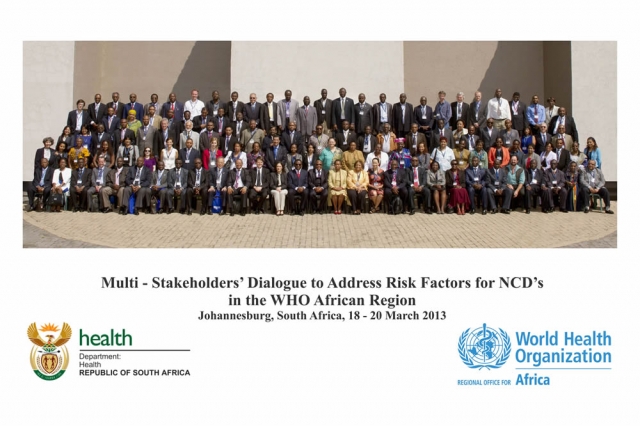Meeting ends with a call for sustained multi-stakeholder dialogue to address noncommunicable diseases in Africa
 Johannesburg, 20 March 2013 --The World Health Organization’s multi-stakeholder dialogue on noncommunicable diseases has ended in Johannesburg with a call for sustained dialogue to stem the tide of the diseases in the African Region.
Johannesburg, 20 March 2013 --The World Health Organization’s multi-stakeholder dialogue on noncommunicable diseases has ended in Johannesburg with a call for sustained dialogue to stem the tide of the diseases in the African Region.
After deliberations on a range of issues, participants highlighted tobacco use, harmful use of alcohol, unhealthy diet and physical inactivity as the four major factors driving the NCD epidemic. They widely recognized the lack of public awareness on the harmful effects of alcohol along with the aggressive advertising and promotion practices which has increased access and consumption among individuals, families and communities. The challenges of regulating traditional brewers in local communities and the sale of alcohol to minors were highlighted. They called for greater involvement of development agencies in addressing the risk factors as well as a more inclusive approach to involve communities and relevant stakeholders in policy development and in relation to legislation, enforcement and enactment.
The tobacco industry’s negative influence on policy making and weak multisectoral coordination in the implementation of the Framework Convention on Tobacco Control (FCTC) were cited as some of the challenges posed by tobacco consumption. It was pointed out that while industry- funded interference is gaining momentum, tobacco control campaigns in most countries are grossly underfunded. The need for clear action plans for the implementation of FCTC, and strengthening the capacity of countries in economics to advance price and tax measures was highlighted.
Participants noted that the African Region have a double burden of food shortages and an increasing consumption of refined foods rich in fat, salt and sugar. Urbanization and increased processing of food has led to a serious problem of obesity. This has consequences on cardiovascular diseases and other major NCDs. They recommended relevant legislation and regulation to be put in place to counter this trend and protect public health. They also underscored the importance of public education on nutrition and health as well as more evidence to inform policies and strategies.
Referring to the growing trend in physical inactivity, participants attributed motorized transport and the lack of recreational space in urban and peri-urban areas as the main contributory factors. They emphasized working together with a wide range of stakeholders to improve community environment and increase opportunities for people to stay physically active. Using schools as an entry point for physical activities along with making physical education a part of the school curriculum was also recommended.
In addressing these challenges, participants called for policy, legislative and regulatory frameworks at the national level to reinforce efforts, strengthening data gathering, analysis, dissemination and operational research, community participation and establishing sustainable resources for financing NCD prevention and control actions.
In his closing remarks, the World Health Organization Regional Director for Africa, Dr Luis Sambo thanked the participants for their valuable contribution to the dialogue. He said: “The World Health Organization is committed to bringing diverse constituencies together to build consensus around complex, multifaceted and in some cases divisive issues regarding risk factors for noncomunicable diseases”.
He informed participants that the WHO Regional Office for Africa has restructured, creating a major Cluster dedicated to health promotion.
“Only with a healthy population can we succeed with socio-economic development”, he added.
Addressing the participants during the closing session, Dr Janet Hunter, Deputy Director-General of the Department of Health of South Africa urged participants to identify mechanisms in their respective countries to facilitate national dialogue and promote awareness about the risk factors for NCDs.
Emphasising the importance of public education, she said: “While legislation and policies are crucial in steering communities towards healthy lifestyle, we must never neglect the need for education individuals and communities. The implementation of laws and policies will only succeed when supported by informed communities”.
The three-day event, organised by the World Health Organization was under the theme: 'Today’s risk factors are tomorrow's diseases'. It attracted around 200 delegates, including public health experts on NCDs and risks factors, researchers and practitioners, senior officials representing relevant government ministries, consumer organizations, the food industry, intergovernmental organisations and other health stakeholders.
The WHO African Region faces a rapidly increasing burden of NCDs alongside the continuing threat of communicable diseases. The main NCDs include cardiovascular diseases, chronic respiratory diseases, diabetes, cancer, sickle-cell anaemia and the consequences of violence and road traffic accidents. Tobacco use, harmful use of alcohol, unhealthy diet and physical inactivity are fuelling the NCD epidemic. These factors act alone or in combination to adversely affect people's health.
______________________________________________________________
For more information, please contact:
Dr Davison Munodawafa, Tel: 00 47 242 39476, email: munodawafad [at] afro.who.int
Collins Boakye-Agyemang, Tel: 00 472 413 9420, email: Boakyec [at] afro.who.int
Eugene Mahlehla, Tel + 27 12 305 77 01 e-mail: Mahlehlae [at] za.afro.who.int
______________________________________________________________


